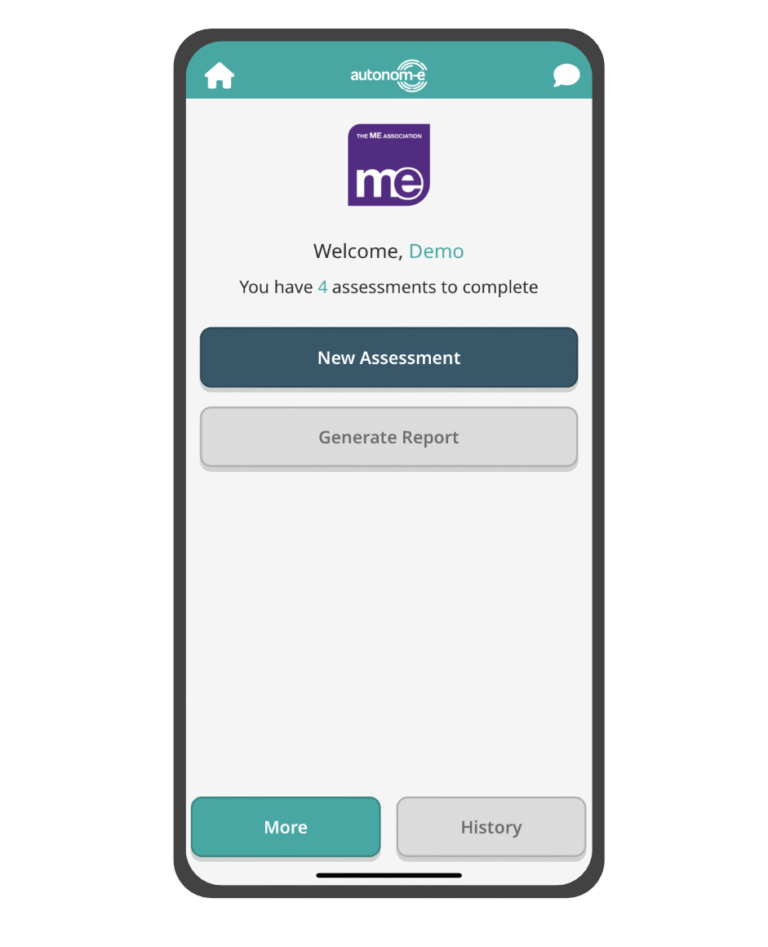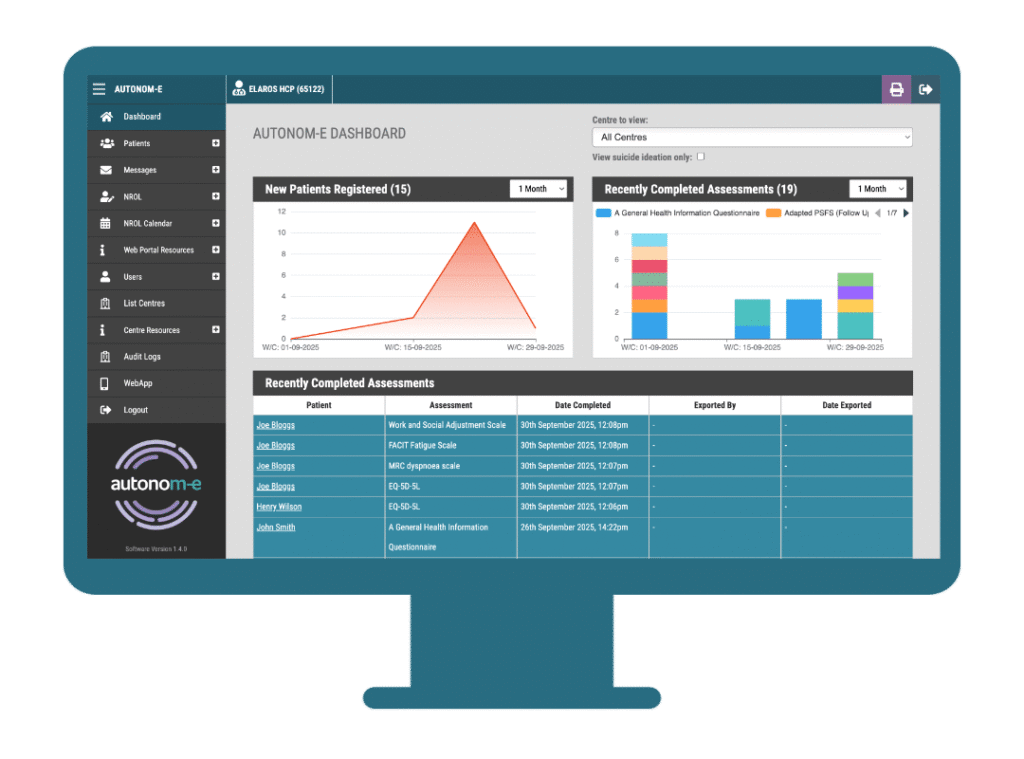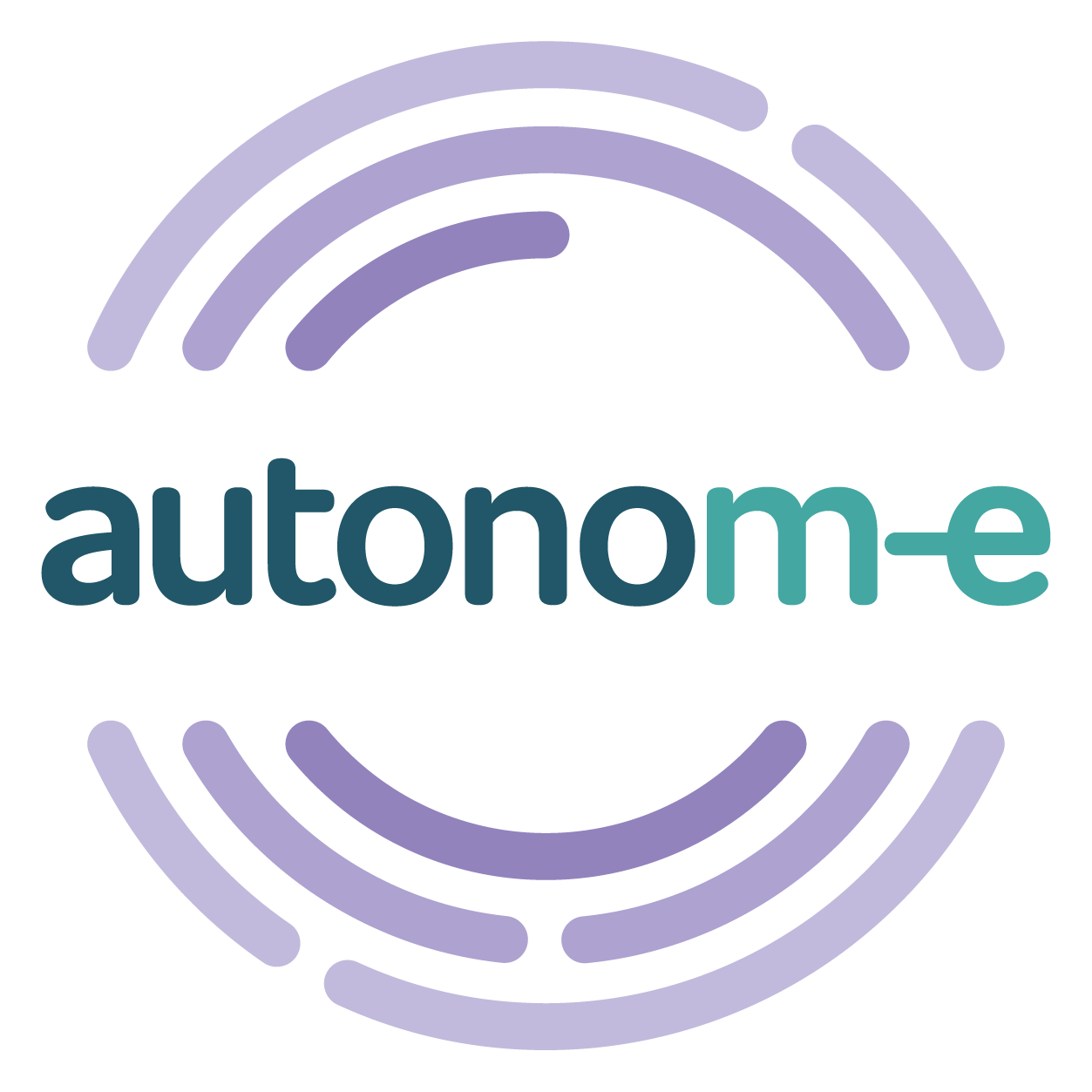The ME Association App and Clinical Toolkit
The ME Association’s app and Clinical Assessment Toolkit is available digitally through the autonom-e app.
- Register onto the ME Association app through autonom-e
- Access the ME Association’s clinical assessment toolkit, co-developed with the ME community
- Generate clinical reports to share with health professionals, employers or relatives
- Access support resources curated by the ME Association
- Direct access to ME Connect, local support groups and nearby services
- Access future updates driven by research with patients for the price of a coffee per month
Purchase subscriptions directly through the app (independently) or for use in clinical services by contacting us at autonom-e@elaros.com

Overview
The ME Association has funded a study led by Prof Sarah Tyson (who also has ME) from the University of Manchester, to develop a clinical assessment toolkit in collaboration with people with ME and clinicians in NHS ME/CFS specialist services.
The ME Association Clinical Assessment Toolkit (MEA-CAT) provides five assessment measures which you can use to load details about your health, from symptoms to functional capacity, to needs.
Four of five assessments are now available as a hardcopy or digitally, via the ELAROS platform. These are the CNAME, PASS, PREM-ME, and TIMES assessments. Our 5th “MEAQ” assessment is coming soon.
Digital versions available through ELAROS' autonom-e app
The ME Association’s toolkit was originally designed for use with ME clinical services, so it also includes a clinical needs assessment, and a patient reported experience measure (also known as a patient satisfaction survey).
Clinical services using ELAROS’ autonom-e platform can share the MEA-CAT with their patients to complete in a digital format through a mobile app, online, as part of a telephone interview, or on paper if necessary and uploaded to the patient’s digital record later, offering patients with alternative accessibility options and to avoid postage, printing and storage.
Accessing the app (public users)
Benefits
- Download "autonom-e" from the app store.
- Click "Create a Personal Account".
- Create an account for free
- Complete assessments and access support resources
- Export and share reports with health professionals or relatives
- Access the app without needing a referral into a service.
- Generate health reports to help interpret your scores and share with health professionals or relatives
- Keep a permanent digital record of your data on a personal device.
- Control who sees your data and share summary report.
Purchasing licencing on behalf of your patients (for clinics, employers and occupational health providers)
- Order a number of licences from ELAROS at autonom-e@elaros.com.
- Receive a list of codes / tokens for the app
- Share with clients / patients
- Complete assessments, diaries, and view resources.
- Export and share reports with health professionals or relatives.
Accessing the app (clinical services)
Benefits
- Contact ELAROS for clinical license enquiries
- Arrange a demo
- Sign-off clinical governance and implementation
- Assign the MEA-CAT, support resources, and clinical appointments via our web portal
- Support patients with their individual goals and evidence impact using data collected from autonom-e
- Nationally recognised, NHS-approved system
- Exchange data remotely between staff and patients
- Use clinically validated instruments to evaluate health status and change over time
- Streamline clinical services with remote appointment scheduling, automated tasks, and scalable support resources
Frequently Asked Questions
How is a clinical assessment toolkit used ?
As noted above, the main use is for clinical assessment. ME is so variable in the type and severity of difficulties it causes, that it can be very hard to explain. We have made sure the MEA-CAT covers all the main problems and difficulties that people with ME face, using language that makes sense for people with ME and, as far as is possible, is easy for people with ME to use. There is also plenty of opportunity for you to add extra information and detail if you wish, so nothing important is missed.
It is expected that you will be given access to the MEA-CAT (either electronically or paper copies) before you attend a clinic for assessment. This will give you opportunity to complete the tools in your own time and at your own pace. This helps you manage your activity levels, reduces the demands of clinic appointment(s) and also means you can be confident that nothing important has been missed. Once complete, your answers are added up to produce the ‘scores’. The final score is often not very meaningful unless you are very familiar with the assessment. So, each tool also has a ‘report card’ which gives a summary of your results. This is the part which is most useful for you and clinicians.
As well as clinical services, the MEA-CAT may also be useful for people with ME to better understand their difficulties, track changes over time, or produce a summary to share with others. It is also expected the toolkit will be of interest to researchers in the UK and overseas.
Who has access to my data ?
You. Whether completed on paper or downloaded from this website, you are the only person who can see your answers. It is your choice whether you wish to share it with anyone else.
How have people with ME/CFS been involved ?
As mentioned above, a key, unique aspect of this project is that it is a patient-led co-production between people with ME and specialist ME/CFS services. This is to ensure that the toolkit provides information that is important and relevant to both people with ME/CFS and clinical services and is easy to use. Ensuring the ‘patient voice’ is heard is front and central to the project.
We have been particularly concerned to involve people with severe ME to ensure their difficulties are recognised and the tools are easy as possible to complete. People with severe ME were included in our advisory group, we took advice from the 25% group (a charity for people with severe ME) and configured the tools to be as accessible as possible. It is a measure of the success of those strategies that about 20% of participants have severe ME. This is a higher proportion than other large questionnaire surveys, such as DecodeME.
Why are professionals from clinical services involved ?
As well as the ME advisory group, there is a clinical advisory group. This includes people who work in ME specialist services from a range of professional backgrounds and types of service. An important factor influencing whether an innovation is taken up in clinical practice is whether it is ‘fit for purpose’. That is, whether it is easy for clinicians to use, provides the information needed, in a way that is needed, and supports (or at least, does not distract from) all the other aspects of care and practice that clinicians need to provide. The clinical advisory group have contributed to every stage of the project. We realise that some people will consider it controversial to work with clinical services. Our view is that one has to engage with people, in order to influence them, or change practice.
Why are there so many questions in the assessments ?
We have made the assessment tools as short as possible. One element of development phase was to remove any questions which were ‘redundant’ or duplicated other questions. However, the TIMES (assessing symptoms) and the MEAQ (assessing activity levels/disability) are still quite long. This is because ME causes a lot of different types and severity of problems, so if there needs to be a lot of questions to be comprehensive. However, they have been broken into sections to make it easier to pace and take breaks. They are also designed so that the sections form ‘stand alone assessments’ which can be used on their own. For example, if you wanted to focus on sleep problems or pain (as far as symptoms were concerned), then after the initial assessment you could just complete these subscales without completing the whole assessment to monitor these issues.
We have also minimised the cognitive demand of completing the toolkit by keeping the questions as short as possible, using accessible formats/styling (based on recommendations for people with dyslexia) and using multiple choice answers with a consistent format.
Why not use objective measures such as activity monitors or heart rate monitors ?
Technology such as heart rate monitors have a great deal to offer people with ME. They are great for measuring an individuals’ day to day variability and to monitor longer term changes, or outcomes. However, they are a non-specific, or proxy measure. For example, a step counter will tell you how many steps you have taken that day, but it won’t tell you what you were doing, or how you had to adapt other activities to do those steps, nor the consequences of doing them. So, although it gives you’re an idea of ‘how you are doing’, it doesn’t give the detail to support discussions and decision-making such as developing a care and support plan.
In the future, it is hoped it will be possible to combine the toolkit with technological objective measurements to get the best of both worlds. However, there needs to be a lot more research into the best parameters to measure, the best way to measure them, how accurate and reliable they are, and to develop inexpensive and easy to use formats, before recommendations can be made for use in clinical practice, or for research.
Looking for ELAROS' Clinical Service for your organisation?
ELAROS' Clinical Service is intended for:
- Clinical service providers supporting people with ME/CFS in the NHS, private services, and insurers
- GP federations, primary care networks and social prescribers that need to signpost people to a digital resource
- Services that want to use a nationally-recognised, secure platform to streamline their services
Clinics or health insurers that wish to purchase a cost-effective alternative to our clinical platform.
The MEA app does not provide:
- Any medical advice, diagnoses or guaranteed referral into a service.
- Access to our web portal intended for clinical staff using our full system.
- Other configurable health questionnaires like GAD-7, PHQ-9, WHO-5, WPI-SS intended for clinical practice.



